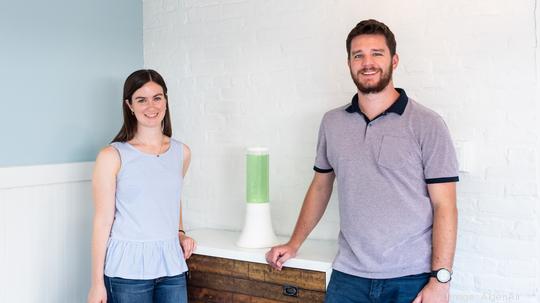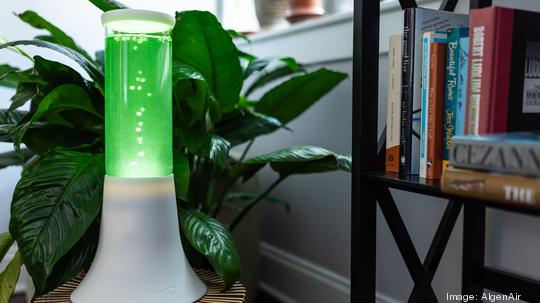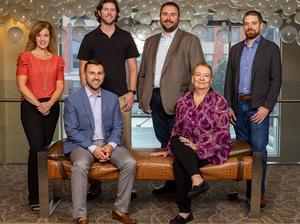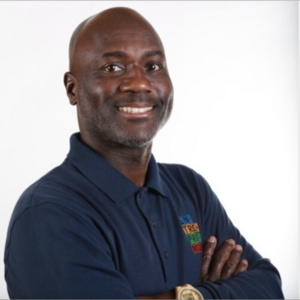
At first glance, the aerium might be mistaken for some sort of chic, green lava lamp. But it’s algae that gives this bubbling device its green hue.
The aerium is the signature product of AlgenAir, a Baltimore company founded by two biologists with recent PhDs. Spirulina algae grows inside, giving off oxygen after consuming carbon dioxide (CO2).
AlgenAir CEO Kelsey Abernathy said the aerium — already sold to customers in seven countries and counting — is set to appear this month on A Touch of Modern. That’s an e-commerce platform with millions of users and a focus on millennial men.
Abernathy co-founded the company with Chief Scientific Officer Dan Fucich. The two recently completed the Techstars Kansas City accelerator. A video they produced for that program’s pitch day in September offers a glimpse at their big picture plan.
“Algae has fundamentally transformed this planet, by putting oxygen in our atmosphere two and a half billion years ago in the great oxygen revolution,” Fucich said in the pitch. “And at AlgenAir, we’re excited for it to improve our health and productivity of the future.”
Abernathy brings the pitch home by describing people living in symbiosis with algae.
“Join us in the second oxygen revolution by using algae to clean the air we breathe,” she said.
Abernathy and Fucich met in grad school at the University of Maryland. They were both enrolled in the Marine Estuarine Environmental Sciences Program, worked at the Institute of Marine and Environmental Technology, and were part of the Ratcliffe Environmental Entrepreneurs Fellowship (REEF) program, which is designed to expose students to the business side of science. The two teamed up for a pitch competition.
“We got this idea that we were going to grow algae on rooftops in underutilized urban areas such as the city of Baltimore,” Abernathy told the BBJ.
Feedback was good. Interest was high, she said.
“Until we realized that putting thousands of gallons of water on roofs? Not the best idea from an engineering standpoint,” she said.
While researching how to get enough carbon dioxide for rooftop algae, the two learned just how high the CO2 concentration is inside many buildings.
“So we pivoted,” Abernathy said. “Now we were going to design a device that would put algae in people’s homes and use it to improve their indoor air quality.”

The first version of the aerium was made from a wine bottle and PVC pipe from Home Depot, she said. They bought a 3D printer. Fucich taught himself computer-aided design to make prototype parts. American Bully in Annapolis Junction was able to make hand-pour molds from the 3D printed pieces, she said.
Replacing the wine bottle was another story. Abernathy struck out with a multitude of domestic glassmakers.
“We found out that UMBC [University of Maryland, Baltimore County] has a scientific glassblower that creates custom lab-ware for the university,” she said. “We took the idea to him and he was able to create a prototype of the glass.”
They used that to lock in an overseas producer, even though its 1,000-vase-minimum was daunting.
"Since we were in grad school, we had access to the graduate pitch circuit. … That’s how we funded the company for the first two years,” she said. “We raised over $125,000 through grants, pitch competitions and accelerators. All non-equity, non-diluted. And that enabled us to launch the product in 2019 and produce our first run.
“Very typical scientist move. We didn’t really realize you had to fully market a product,” Abernathy continued. “We got an OK number of sales just from the interest we’d generated over the years creating the product and through the pitch competitions. But once Covid hit … we took a bit of a step back.”
The co-founders turned their attention to wrapping up their PhDs and working with two other startups. Then, in the summer of 2020, AlgenAir hired a marketing firm.
“We turned marketing on and maxed out American Bully’s manufacturing really quickly,” she said.
They started to scale, securing a California company to make compression molds for the parts. Setup for the aerium — which sells for $249 — involves putting together a few parts, pouring in a bottle of algae, a bottle of nutrients and some distilled water. In about two months, it’s time to empty and repeat. Customers are encouraged to use the old algae in compost or to fertilize houseplants.
Abernathy said a letter recently arrived saying litigation should come up within seven months on the patent application they filed in April 2020.
Their efforts are timely. The New York Times this month reported on a trend of parents smuggling CO2 monitors into schools with their kids. Parent thinking there, per the article, is that CO2 levels would offer a glimpse at ventilation and therefore help them surmise how concentrated Covid-19 particulates might be.
But high concentrations of CO2 in and of itself can be bad for focus and health, Abernathy said. She and her cofounder aren’t the first to think of using algae in response.
“But most of what I’ve seen has been: Scientific researcher. Art installation,” she said. “No one has ever taken the step to actually make it a consumer product and that’s something we have the advantage of being first on market for.”
That does bring some challenges, like the pond-scum-referencing comments Abernathy sometimes sees posted on AlgenAir Facebook ads.
“The public’s perception of algae is not necessarily great. What’s interesting is … I say spirulina and people are like 'Oh, yeah. Smoothies, health supplements, I love that,’” she said. “I say algae and they’re like, ‘Gross, my fish tank.’ So there’s a little bit of that education barrier there.”
The aerium is a solution for rooms, Abernathy said. The plan is to scale the technology to entire homes, office buildings, schools and hotels. AlgenAir is exploring funding options toward that end.
At Techstars, AlgenAir was paired with one of Kansas City’s many architects.
“We are working with a company out there — it’s still pretty early — to do kind of a pilot installation in a commercial building over the next year,” she said.
Rebecca Logan is a contributing writer based in Pennsylvania.










